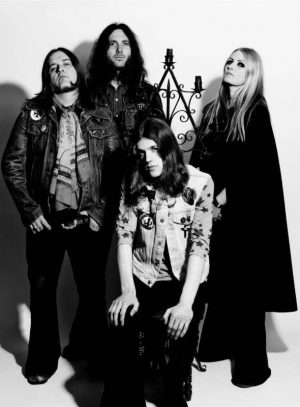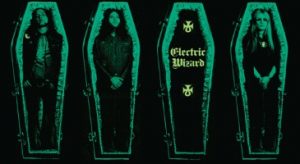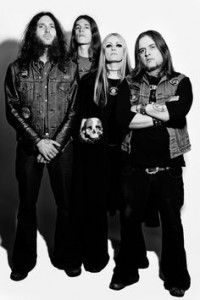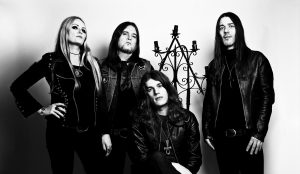
Two decades of doom dealing could easily take its toll on lesser bands, but Dorset’s ELECTRIC WIZARD have taken all that misanthropy, occult leanings and horror fanaticism and weaved it into an eighth album of dreary, but omnipotent intent. Back in 2014 line-up and label woes, paranoia and over-indulgence were been thrown into the cauldron and the result, ‘TIME TO DIE’ made the band never sound more alive. Jim Martin spoke to JUS ORBORN for Iron Fist back in Issue 12 and we’ve dug it out of the archives in time for their headline slot at tomorrow’s DAMNATION FESTIVAL in Leeds…
The tranquil sound of a mountain stream drifting through a forest. Not something one would naturally associate with Electric Wizard, but this is how their new album, the intimidating ‘Time To Die’ kicks off, and in such a fashion that one could be forgiven for assuming they’ve purchased the wrong record. That is, until the distinct strains of a Hammer-style Hammond, ’60s garage drumming, and sampled news reports concerning Satanism drift into view through the ether, and the rural paradise proves short-lived. “On one level it reminds people that we’re from Dorset, just to get people back to our frame of mind immediately,” muses Electric Wizard’s chief sorcerer Jus Oborn.
Indeed, ‘Time To Die’, which is the first release for the band through their own imprint Witchfinder Records (distributed by Spinefarm) marks a return-to-the-roots for Electric Wizard in more ways than one. Possibly the Wizard’s most way-out record since 2003’s ‘Let Us Prey’, it’s a fearful miasma of dread, a needles-in-the-red onslaught of overbearing metaphysical malice. Moreover, it’s one that makes their last two albums, 2007’s ‘Witchcult Today’ and 2010’s ‘Black Masses’ – which together, building on a period of relative stability for this always volatile troupe, saw their stature grow from that of a vital underground anomaly to one of the biggest cult metal bands in the world – sound comparatively restrained.
All told, it was set up initially as a record that would herald a step back for the band in a sense, into the nightmarish but compelling fug of the band’s early material, in which the then three-piece, comprising Oborn, bassist Tim Bagshaw and drummer Mark Greening threatened both their own sanity and the well-being of all those around them – their legendarily debauched and wayward lifestyle spilling into genre-classics-to-be such as 1997’s terrifying ‘Come My Fanatics…’ and 2000’s totemic ‘Dopethrone’. In a seemingly explicit gesture, Greening – who had originally left the band after a catastrophic US tour in 2003 to form Ramesses – rejoined, and his influence is indeed manifest on the new record. “Yeah, I guess with Mark, [he] was probably pushing to making a sequel to ‘Let Us Prey’ anyway, and it’s definitely got a bit of that feel. That’s the way it was going, that sound,” Jus confirms when we mention that the new record reminds of ‘Let Us Prey’. “He’s had an influence on the songwriting at least in terms of the way the jams go.”
 Yet there were other influences that led to this record sounding like quite the nihilistic psychic burn-out that it does. These aren’t explicitly discussed today, as previous airings of grievances both in print and in various portals of the internet have left a still more pungent air of acrimony around the band than any they’ve previously encountered. Too much of this kind of talk might threaten to eclipse the main focus of the band’s music, but it’s clear that the band’s parting from Rise Above Records, whilst unintentionally influencing the new album’s sound, was no easy ride for either party.
“A lot of outside influences were making us a bit paranoid, feeling everyone was against us, so it was quite an aggressive album,” reckons Oborn obliquely. “But we thought we’d stay on it, because the last few albums have been quite cinematic, based on movie stuff, the occult, black magic. We thought we’d do one that’s a lot more realistic, a lot more serious, at least on one level.”
Yet there were other influences that led to this record sounding like quite the nihilistic psychic burn-out that it does. These aren’t explicitly discussed today, as previous airings of grievances both in print and in various portals of the internet have left a still more pungent air of acrimony around the band than any they’ve previously encountered. Too much of this kind of talk might threaten to eclipse the main focus of the band’s music, but it’s clear that the band’s parting from Rise Above Records, whilst unintentionally influencing the new album’s sound, was no easy ride for either party.
“A lot of outside influences were making us a bit paranoid, feeling everyone was against us, so it was quite an aggressive album,” reckons Oborn obliquely. “But we thought we’d stay on it, because the last few albums have been quite cinematic, based on movie stuff, the occult, black magic. We thought we’d do one that’s a lot more realistic, a lot more serious, at least on one level.”
Always a band who’ve existed on their own peculiar wavelength, the band moved their operations to a new outpost in the depths of Somerset, the new home of Oborn and Liz Buckingham (Electric Wizard guitarist and Oborn’s wife) to happily make a racket as far away from civilization as they could possibly manage. “I’d say part of the band had gone astray, and it was getting back to being completely away from everything,” reckons Oborn. “I mean, it’s so easy to take in influences constantly, and then you end up sounding like everyone else. You’ve got to get away. “We converted the garage into a rehearsal room specifically for that purpose,” he adds. “So we could just jam out here in the middle of nowhere rather than be involved in a rehearsal room situation where there’s a certain amount of time, and doing demos and stuff. I mean, bands get into a similar routine, and we wanted to break out of that and get back to our roots, which is jamming really.” The move to Somerset happened largely, according to Oborn, because Dorset had been becoming too gentrified, plus, “they’d priced everyone out as well. Bastards! There are a lot of places you can go, but I prefer the landscape here. I don’t particularly like people that much, and I can take it or leave it here, and not get involved. Somerset’s a bit more dodgy, I remember this from being a youngster – I mean it’s still quite rural, I mean proper rural, there’s farming going on here. It’s a bit more brutal and a little more rednecky but I like it. It suits my mindset.” Once they were there, the hive-mind atmosphere took over, and the sound began to take shape, harking back further in Wizard’s psyche than anything the band had done this century. “The roots of our influences [are] going back even further, I think. There was a lot more bluesy and ’60s influences with this album, a bit of Cream and Blue Cheer, which is right back to the beginning beginning really, before the first album.”
Central to the album are the taped spoken word interludes, which not only hark back to their earlier, trashier records, but bring the focus sharply back onto the old Electric Wizard stomping ground of the intersection between Satan, rock music and whatever passes for the real world. “It’s all from an old cassette, which I’ve pretty much had from the beginning of any band I’ve been in, since the tape-trading days,” reveals Jus. “I used to trade a lot of audios of documentaries about Satanism and heavy metal, cos it kind of amused everyone at the time, y’know, and we used them on a lot of the earliest tapes, so I thought part of the going-full-circle was to bring that original cassette back, and I managed to make a cut-up of pretty much everything on it and re-jigged it to sort of tip it over the edge.”
 Much has been made in the accompanying press release of this album being thematically obsessed with death and rebirth, and according to Jus this was ultimately something that happened naturally, as the overbearing atmosphere the band encountered making the record drifted into the jams and the attendant creativity. “As the lyrics evolved, it became very heavy lyrically and then the songs developed heavier sections because of that. So with the outside influences [it] just became a lot more depressing. We didn’t like to be morbid, I don’t think Electric Wizard has ever been like that. It was a bit more sticking a [middle] finger up rather than going in a corner and weeping.”
It seems that there’s a certain balancing act required to make life in Electric Wizard work; using the music as an all-encompassing exploration of negativity without said negativity affecting the bands’ own lives unduly, we suggest. How does Jus draw a line between the two things?
“If you do try to then your art becomes muted I think, and that was something that unfortunately I had to come to terms with on this album. I probably pushed myself quite hard to get right back in the zone you know,” he laughs a little darkly “And you know, you start burning the candle at both ends and indulging a bit too much. I don’t know, I wanted to get back to where I used to be, not put limits on it to save my sanity. But I got a bit on the edge there for a bit.”
Much has been made in the accompanying press release of this album being thematically obsessed with death and rebirth, and according to Jus this was ultimately something that happened naturally, as the overbearing atmosphere the band encountered making the record drifted into the jams and the attendant creativity. “As the lyrics evolved, it became very heavy lyrically and then the songs developed heavier sections because of that. So with the outside influences [it] just became a lot more depressing. We didn’t like to be morbid, I don’t think Electric Wizard has ever been like that. It was a bit more sticking a [middle] finger up rather than going in a corner and weeping.”
It seems that there’s a certain balancing act required to make life in Electric Wizard work; using the music as an all-encompassing exploration of negativity without said negativity affecting the bands’ own lives unduly, we suggest. How does Jus draw a line between the two things?
“If you do try to then your art becomes muted I think, and that was something that unfortunately I had to come to terms with on this album. I probably pushed myself quite hard to get right back in the zone you know,” he laughs a little darkly “And you know, you start burning the candle at both ends and indulging a bit too much. I don’t know, I wanted to get back to where I used to be, not put limits on it to save my sanity. But I got a bit on the edge there for a bit.”
Indeed, despite certain Wizard fans, this one included, habitually harking back to the self-hospitalising, police-alerting, falling-off-a-church-trying-to-nick-a-crucifix days of yore, it’s worth stressing that those days weren’t much fun either for the band, their fans (who frequently had to cope with no-shows and haphazard gigs) or their then-label. Despite the bleak magick of records like ‘Come My Fanatics…’ and ‘Dopethrone’, these particular transmissions from oblivion wreaked considerable psychic havoc on their surroundings. “Yeah, I mean that’s what I’ve said to people, we weren’t really enjoying ourselves back then. I don’t think the band was very well-organised, I don’t think we really knew what we were doing. We had a lot of raw shit. The whole thing wasn’t very well developed back then, we never really made a penny. It was all a bit fraught you know, a bit too much drinking. I think everyone started to overindulge a bit towards the end. These days it’s a little bit better organised. It’s not quite so miserable. It’s a bit more of an option now to tour, the guarantee means that we will get a hotel, and we’re not going to end up sleeping in the back of the van, or trying to find somewhere to stay, or any of that shit.” Does Jus feel that he has enough distance now to be able to have a clear perspective on the band’s older records?
“Yeah, I think I can listen to them quite objectively now. I think I’m listening to some kids in their early 20s who are really venting their fucking frustrations with the world on the shittiest, cheapest equipment imaginable. And I can listen to it on that level, and then the band starts to evolve and it’s inevitable. I can’t be a fucking teenager for the rest of my life. I mean, most metalheads will stretch it out into your late 20s, but then your hair starts to fall out!”
Unfortunately, once the album was done and dusted it seemed Wizard’s troubles were far from over. No sooner was ‘Time To Die’ on the verge, with a new label in place, that Mark Greening was out of the band again following a catastrophic show at Temples Festival in Bristol. Never the tightest drummer on the face of the planet, rather bringing a luded-out Ginger Baker rattle to the band’s earliest material as well as a horror-fixated aesthetic to their sound, Greening’s contribution to ‘Time To Die’ may have been unmistakeable, but his re-established tenure in the live band, now that Wizard were a considerably tighter and more professional unit – headlining festivals in this day and age rather than doing bong hits onstage upstairs at the Garage in London – looked shaky from the outset.
The (considerable) fallout from this departure may be part of the reason that Jus sounds a little downcast this afternoon. “If I say it then it’s going to sound negative but probably, I don’t know. This era of the band’s over, even being a band in this way maybe is finished,” he speculates, when asked how seriously we should take the album’s death-and-resurrection theme. In what way exactly does he mean? “Well, we’re going to go out and perform this record and everything, but I think we’ve moved beyond the formula so to speak. Maybe do different types of music, do a lot more movie stuff as well.”
Does he think this might be a negative reaction to the mood of the last year or so, or does he genuinely think the music’s run its course? “Well, in some ways. I can see ways of progressing but not mining the same rut for ever. Especially when everyone else is mining the same rut, and it’s so fucking anodyne,” he laughs. “I mean I can see a lot more to do, but just playing my guitar, open chords as slowly as possible; there is a limit to it. And I do want to play heavy shit. I don’t want to ‘Oh, let’s explore being mellow’. I want to try and take it in a direction.”
 It was this kind of push-the-limits sensibility that essentially led to ‘Time To Die’, which to many long-standing Wizard acolytes will stand as their best record in over ten years, and in spite of the travails Oborn and his band – now also including Satan’s Satyrs mastermind Clayton Burgess on bass and returning drummer Simon Poole – have been through in its creation, one hopes that posterity will judge it as so. After all, the experimental edge that Wizard had at their disposal was always the thing that separated them from their more conservative peers; the Sabbath worship might have been explicit even in the band’s name, but there was always a crucial drive towards overload and otherworldliness in Wizard’s makeup-witness the ambient interludes and sinister drones of ‘Weird Tales’ from ‘Dopethrone’ or ‘Ivixor B/Phase Inducer’ from ‘Come My Fanatics…’ for evidence.
The worst thing that could happen to Wizard, it’s suggested to Jus, would really be for them to sink into the realm of self-parody, in the style of say Venom releasing albums with titles like ‘Metal Black’.
“Yeah, well unfortunately the way the industry works and the festival circuit, you can rely on that for an income.” he notes wryly. “It’s like a cabaret act. Wacken’s a little bit like a heavy metal Las Vegas.”
It was this kind of push-the-limits sensibility that essentially led to ‘Time To Die’, which to many long-standing Wizard acolytes will stand as their best record in over ten years, and in spite of the travails Oborn and his band – now also including Satan’s Satyrs mastermind Clayton Burgess on bass and returning drummer Simon Poole – have been through in its creation, one hopes that posterity will judge it as so. After all, the experimental edge that Wizard had at their disposal was always the thing that separated them from their more conservative peers; the Sabbath worship might have been explicit even in the band’s name, but there was always a crucial drive towards overload and otherworldliness in Wizard’s makeup-witness the ambient interludes and sinister drones of ‘Weird Tales’ from ‘Dopethrone’ or ‘Ivixor B/Phase Inducer’ from ‘Come My Fanatics…’ for evidence.
The worst thing that could happen to Wizard, it’s suggested to Jus, would really be for them to sink into the realm of self-parody, in the style of say Venom releasing albums with titles like ‘Metal Black’.
“Yeah, well unfortunately the way the industry works and the festival circuit, you can rely on that for an income.” he notes wryly. “It’s like a cabaret act. Wacken’s a little bit like a heavy metal Las Vegas.”
Watching Electric Wizard headline the Reverence Festival in Valada, near Lisbon, a few weeks after, with Poole’s drumming and Burgess’ disarmingly youthful Butler/Burton four-string chops bolstering a headline set that transforms a Portuguese football field into a gloomy arena of communion, the outlook for Wizard looks markedly less bleak. What’s more, despite the band’s recent success, not to mention their position on a bigger label, ultimately coming with more pressure, Jus is adamant that whatever happens from here on in, they’re not about to change their fundamental modus operandi any time soon.
“If you find yourself listening to what the fans think and what they want – there is a certain degree of responsibility to the people who’re gonna keep buying the records and coming to your gigs, you know,” he laughs. “That’s important, but you do want to move forward. I like that we’ve kept integrity in terms of the fact that we’re still a very heavy band. We haven’t brought in commercial or lighter elements to prove that we’re clever or anything. I’ve not got a lot of admiration for the people that weaken and dilute metal. Getting heavy is the reason for playing music for me. There’s a lot more fun factor now!”
In the metal scene, he means presumably, not in Electric Wizard, surely?
“No, not for us. No! I mean that’s why we feel like we’re getting ostracised! We’re in the corner with the black sunglasses, just thinking it’s all shit.”
Copyright © 2024 Iron Fist Magazine. All Rights Reserved.